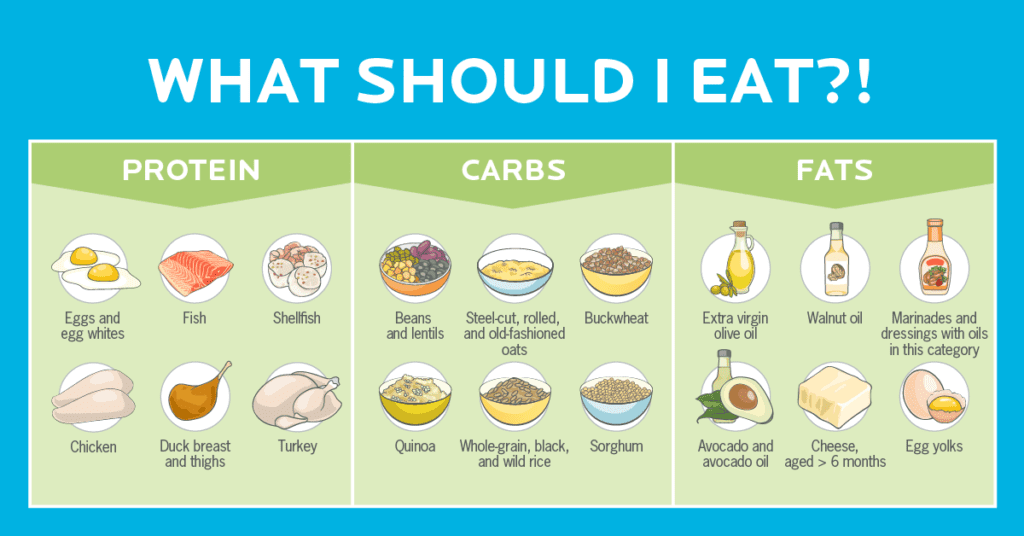Reviewed by Brian St. Pierre, MS, RD
Growing up, we learn that vitamins and minerals are essential for health.
(We all took those animal-shaped multis, right?)
But what does that mean?
What vitamins do we need, and why?
How can we get the minerals our body needs for optimal health and well-being?
In this article, we’ll take a detailed look at vitamins and minerals, where they come from, what they do, and what happens if you don’t get enough or too many of them.
What are micronutrients?
Micronutrients are the vitamins and minerals your body needs in smaller quantities (as opposed to macronutrients, which are needed in larger quantities).
Your body can’t produce micronutrients, so you must rely on your meals to give you what you need. That’s why they’re also known as “essential nutrients.”
Vitamins are found in plants and animal products and can be broken down or altered by heat, acid, or air.
In contrast, minerals are inorganic, originate from soil or water, and cannot be broken down.
When you eat, you’re consuming the vitamins produced by plants and animals and the minerals they’ve absorbed. Each food item carries a unique micronutrient load, so it’s important to eat a wide variety of foods. (We’ll discuss later which foods are best for getting which micronutrients.)
Vitamins and minerals fuel growth, bolster your immune system, and even shape your brain’s development.
Types of micronutrients and what they do
There are four categories of micronutrients, defined by what they are and how they work in your body.
Water-soluble
Water-soluble vitamins readily dissolve in water, then your body uses what it needs. Whatever’s left is excreted (through urine and sweat, primarily), not stored.
The water-soluble micronutrients include Vitamin C and the eight B Vitamins: B1, B2, B3, B5, B6, B7, B9, and B12.
Fat-soluble
Unlike water-soluble micronutrients, fat-soluble vitamins are stored within the liver and fatty tissues.
To be absorbed, fat-soluble vitamins must be consumed with dietary fats.
The fat-soluble micronutrients are Vitamins A, D, E, and K. These aid in fortifying the immune system, proper bone development, preserving eye health, and shielding cellular structures from harm.
While it’s usually best to get these vitamins from food sources, if you suspect a deficiency, ask your doctor about whether you should take a supplement. Taking supplements without consulting a doctor is riskier, as fat-soluble vitamins can accumulate in the body. (We’ll discuss the possible effects of that later.)
Macrominerals
Macrominerals get their name because they’re required in larger quantities than other micronutrients and serve many vital functions.
The macrominerals are:
- Calcium
- Chloride
- Magnesium
- Phosphorus
- Potassium
- Sodium
- Sulfur
Trace Minerals
While your body doesn’t need these in large quantities, trace minerals significantly affect your overall health and are essential for various bodily functions.
The trace minerals include iron, manganese, copper, zinc, iodine, fluoride, and selenium.
Why are micronutrients important?
Micronutrients are necessary for proper bodily functions.
For example, folate (Vitamin B9) plays a pivotal role in genetic material creation, cell division, and birth defect prevention.
Calcium fortifies bones, aids circulatory function, and supports nerve activity and hormonal secretion. Iodine impacts cognitive development and thyroid health.
Antioxidant micronutrients—Vitamins A, C, and E, along with copper, zinc, and selenium—shield the body from oxidative stress caused by free radicals. In excess, these free radicals—produced from normal metabolic processes—can harm tissues, organs, and genetic material.
Micronutrients in growth and development
In children, micronutrients are absolutely essential for growth because they support brain and immune system development. They also act as catalysts for metabolic reactions and regulate fluid balance.
Micronutrients and physical performance
While macronutrients are often at the forefront of dietary considerations for athletes and fitness enthusiasts, micronutrients also play a pivotal role.
For example, electrolytes (sodium, potassium, and calcium) help prevent dehydration and replenish salts lost from excessive sweating.
Efficient micronutrient intake before, during, and after exercise:
- Supports blood glucose regulation and healthy muscle glycogen levels
- Enhances endurance, strength, and recovery
- Aids protein synthesis and immune function
Athletes also need to pay attention to:
- Antioxidants like Vitamins C, E, and beta-carotene (which converts in the body to Vitamin A), which protect cells from exercise-induced oxidative stress
- B Vitamins, which improve energy production and metabolism
- Vitamin D, which enhances muscle function and physical performance. Getting enough Vitamin D is especially important for indoor athletes and those in regions with limited sun exposure
- Avoiding mineral deficiencies (especially in calcium, magnesium, iron, zinc), which impact bone health, muscle performance, and metabolic processes.
Micronutrients and weight management
Individuals hoping to lose weight must maintain their micronutrient intake even if they cut calories.
Although micronutrients do not induce weight loss directly, micronutrients like zinc, magnesium, and chromium play supportive roles in the weight loss process: Low levels of zinc cause the body to store extra fat; Magnesium helps maintain a healthy metabolism; Chromium helps keep blood sugar levels under control.
Ideally, try to obtain these micronutrients by consuming a variety of minimally-processed foods, rather than relying solely on supplements.
Vitamins and minerals are more potent when they come from food, and our bodies process them more efficiently than through supplements,
Micronutrients in cellular health and immunity
Micronutrients influence enzymatic activity—they promote healthy tissues and prevent excessive free radical damage, which also helps protect DNA and reduces the risk of many diseases.
Additionally, micronutrients like Vitamins B6, C, and E, as well as magnesium and zinc, fortify the immune system, enhancing barriers against pathogens and infection-fighting mechanisms.
Micronutrients and overall health
Zinc is a micronutrient that helps maintain overall health. It’s distributed within various cells across your body, playing a pivotal role in bolstering your immune system against bacteria and viruses.
Zinc is also instrumental in synthesizing DNA and producing essential proteins. Throughout pivotal stages such as pregnancy, infancy, childhood, and adolescence, a sufficient supply of zinc helps with growth and development.
Finally, this micronutrient aids in effectively healing wounds and is fundamental for ensuring a keen sense of taste.
Best sources for micronutrients
Obtaining micronutrients from diverse food sources promotes optimal health. Here are some of the best sources for getting the micronutrients you need.
Food sources of water-soluble vitamins
- Vitamin C (ascorbic acid): Citrus fruits, kiwi, bell peppers, broccoli, strawberries, and tomatoes.
- Vitamin B1 (thiamine): Found in whole grains, fortified cereals, pork, beef, trout, tuna, and black beans.
- Vitamin B2 (riboflavin): Eggs, beef liver, milk, yogurt, cheese, fortified cereals, almonds, and clams.
- Vitamin B3 (niacin): Chicken, turkey, beef, pork, salmon, tuna, peanuts, potatoes, and rice.
- Vitamin B5 (pantothenic acid): Beef, chicken, organ meats, whole grains, shiitake mushrooms, sunflower seeds, and avocado.
- Vitamin B6 (pyridoxine): Chickpeas, beef liver, turkey, tuna, salmon, chicken, fortified cereals, potatoes, and bananas.
- Vitamin B7 (biotin): Organ meats, eggs, salmon, pork, beef, sunflower seeds, almonds, and sweet potatoes.
- Vitamin B9 (folate): Beef liver, spinach, fortified cereals and grains, asparagus, brussels sprouts, beans, and nuts.
- Vitamin B12 (cobalamin): Beef liver, nutritional yeast, fatty fish (salmon, tuna), clams, beef, dairy products, and eggs.
Food sources of fat-soluble vitamins
- Vitamin A: Beef liver, fish, eggs, fortified dairy products, sweet potatoes, carrots, and cantaloupe.
- Vitamin D: Fatty fish like trout, tuna, salmon, fish liver oils, egg yolks, fortified milk, and UV light-exposed mushrooms.
- Vitamin E: Nuts (almonds, hazelnuts), seeds, vegetable oils, spinach, and broccoli.
- Vitamin K: Leafy greens (collard greens, spinach, kale, broccoli), vegetable oils, blueberries, and pomegranate juice.
Food sources of macrominerals
- Calcium: Dairy products, fortified orange juice, canned sardines and salmon with bones, tofu, soybeans, spinach, and kale.
- Magnesium: Spinach, pumpkin seeds, chia seeds, almonds, cashews, peanuts, soy milk, black beans, potatoes, and brown rice.
- Phosphorus: Dairy products, salmon, chicken, beef, scallops, lentils, potatoes, and kidney beans.
- Potassium: Dried apricots, lentils, prunes, raisins, potatoes, oranges, bananas, and acorn squash.
- Sodium: Salts and processed foods like bread, deli meats, frozen meals, canned foods, chips, and salted popcorn.
- Sulfur: Broccoli, cabbage, cauliflower, onions, garlic, dairy products, fish, legumes, nuts, meats, raspberries, and wheat germ.
Food sources of trace minerals
- Copper: Shellfish, seeds, nuts, organ meats, whole grains, chocolate, potatoes, and mushrooms.
- Chromium: Beef, pork, turkey, brewer’s yeast, grape and orange juice, and grain products.
- Fluoride: Brewed tea and coffee, shrimp, and water with added fluoride.
- Iodine: Iodized salt, seaweed, fish, eggs, cheese.
- Iron: Beef, pork, turkey, fish, fortified cereals and grains, spinach, tofu, lentils, beans, and dark chocolate.
- Manganese: Whole grains, clams, oysters, mussels, nuts, soybeans, legumes, rice, coffee, tea, and leafy green vegetables.
- Molybdenum: Legumes, whole grains, nuts, beef liver, milk, and yogurt.
- Selenium: Brazil nuts, fish, shrimp, organ meats, fortified cereals, beef, turkey, chicken, and dairy products.
- Zinc: Found in beef, oysters, blue crab, fortified cereals and grains, pumpkin seeds, turkey, cheese, and shrimp.
To meet your micronutrient needs, prioritize nutrient-dense foods while maintaining a balanced calorie intake. For optimal health, moderate your sodium, saturated fat, added sugars, and alcohol consumption.
What happens if you don’t have enough micronutrients?
Getting enough micronutrients for each stage and phase of your life is important.
How much you need of each will depend on how much you exercise, your gender-assigned-at-birth, weight, and several other factors. Not getting enough is called a deficiency.
Diets high in highly-processed foods, disordered eating, and malabsorption conditions like Crohn’s disease can contribute to deficiencies.
The impact of these deficiencies isn’t always visible; some signs of micronutrient deficiencies are more subtle, like decreased energy and mental sharpness. These often result in hindered learning, reduced work productivity, and heightened susceptibility to infections and diseases.
Some of the most common micronutrient deficiencies and their symptoms include:
- Vitamin A deficiency: Night blindness, impaired vision, stunted growth
- Biotin deficiency: Metabolic acidosis, dermatitis, seizures
- Vitamin C deficiency: Bleeding gums, petechiae, impaired wound healing
- Calcium deficiency: Cataracts, osteoporosis, dental changes
- Vitamin D deficiency: Muscle weakness, bone pain, low mood
- Vitamin E deficiency: Ataxia, myopathy, vision impairment
- Fluoride deficiency: Weakens teeth and bones, and increases tooth decay
- Folate deficiency: Weakness, difficulty concentrating, heart palpitations
- Iodine deficiency: Goiters, intellectual disabilities, feeling cold
- Iron deficiency: Fatigue, pale skin, dizziness, cold extremities
- Vitamin K deficiency: Slower blood clotting, hemorrhagic diseases
- Potassium deficiency: Irregular heartbeat, muscle weakness
- Selenium deficiency: Cardiomyopathy, deforming arthritis
- Zinc deficiency: Diarrhea, hair loss, delayed growth
To prevent deficiencies, eat a balanced diet rich in diverse sources of these vital micronutrients. Fortified foods—and supplements, with your doctor’s approval—can also bridge the gap.
What happens if you have too many micronutrients?
While less common than micronutrient deficiencies, consuming too many micronutrients is possible.
This is called toxicity. It’s much more likely to happen when taking supplements, so speak with your doctor about safe use.
Some of the most common micronutrient toxicities and their symptoms include:
- Vitamin A toxicity: Dizziness, nausea, and, in severe cases, bone pain and blurred vision
- Calcium toxicity: Kidney stones, constipation, and kidney damage
- Vitamin D toxicity: Nausea, vomiting, and weakness
- Vitamin E toxicity: Excessive bleeding
- Vitamin K toxicity: Disruption of blood clotting
- Iron toxicity: Damage to the lining of the stomach and intestines, vomiting, stomach ache, loose stools, and hypovolemia
- Selenium toxicity: Nausea, vomiting, discoloration, brittleness, and loss of nails, loss of hair, fatigue, irritability, and foul breath odor
- Zinc toxicity: Vomiting, hematemesis, nausea, muscle cramps, watery diarrhea, and abdominal pain
Build a healthy diet with Precision Nutrition
A healthy, well-balanced diet full of nutritious food is your key to overall wellness.
If you want help building an optimal nutrition plan to support your specific goals, try our 1:1 coaching program. You’ll be paired with your own expert coach, who will help you determine your ideal dietary pattern—and help you sustain it.
Whatever your health goals, Precision Nutrition is here to help you reach them.







Share